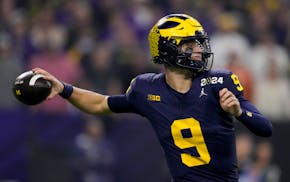The Vikings played the final 48½ minutes of Sunday's game with only five healthy offensive linemen. One more injury up front and, well, that's not something tight end Rhett Ellison cares to think about.
"It's never really discussed, but I would have gone in and played tackle," Ellison said. "I'm sure we would have slid our protection to my side to help me out. At least that's my guess."
With everything the Vikings have gone through this season, perhaps it's fitting that no one at Winter Park could remember seeing two offensive linemen suffer game-ending injuries on the same play.
"That," said 10-year backup center Joe Berger, "was a new one for me."
The Vikings had just gotten the ball at the Buffalo 27 following a fumble recovery with 3 minutes, 49 seconds left in the first quarter of Sunday's game at Ralph Wilson Stadium.
On first-and-10, rookie running back Jerick McKinnon went off right end for what appeared to be a routine 3-yard gain. He returned to the huddle as center John Sullivan and right guard Vladimir Ducasse headed to the sideline because of a concussion and a bum knee, respectively.
"I looked up and two of our guys are coming off the field," backup lineman Mike Harris said. "We didn't even call timeout."
Only 22 seconds elapsed between the time Sullivan and Ducasse exited the game and the next snap.
"Coming into an NFL game cold like that definitely has a challenge of its own," said Berger, who took over for Sullivan. "Fortunately, that's kind of been my niche. And if you're going to have that as your niche, you better come through because guys get hurt in this league."
Playing guard in a pinch is anything but Harris' niche. In fact, he's a tackle who hadn't seen time at guard since he was 10 years old playing Pop Warner football.
"I had to run in and coach was like, 'Play right guard,'" Harris said. "And I'm like, 'What? I've never done it in my whole life.'"
Sunday's loss to the Bills was the third consecutive week that Vikings coach Mike Zimmer had gambled on the durability of his offensive line. Instead of keeping eight linemen active, as he had for the first four games, Zimmer had only seven linemen "up" for the game.
The other two linemen on the roster are guards David Yankey and Austin Wentworth. Both are rookie projects with no special teams value. So they were among the seven gameday inactives.
Another key reason neither was active is Berger is capable of backing up all three interior line positions. He has played in 94 career games and has made starts at center and both guard positions.
Berger is one of the most versatile and underrated players on the team. But one thing he can't do is play two spots at the same time.
Meanwhile, at 250 pounds, Ellison is a sturdy tight end, a scrawny tackle and someone who knows he really doesn't belong at guard, not to mention center.
So what would have happened if a third injury had occurred at center or guard on Sunday?
"If Joe had gone down, Charlie [Johnson] can move from left guard to center," Ellison said. "Then one of the tackles would have moved to guard, I'm guessing. I'm pretty sure they don't want me playing guard."
Ellison said teams don't plan on losing two offensive linemen and "you're never thinking three linemen going down in one game, that's for darn sure."
"But," he added, "we did see the Falcons lose three linemen and have to use their tight end at tackle when they played us [in Week 4]. Maybe it's something we need to practice now."
These kind of laughable scenarios serve as good examples for those who want the NFL to eliminate the rule of making teams deactivate seven of their 53 players before each game. Seahawks coach Pete Carroll is one of the outspoken critics of the rule.
"Why can't we have 53 guys dress and get them all out there?" Carroll asked earlier this week. "We're paying them. They're practicing, and they're ready."
The intent of the rule is based on keeping a competitive balance. Teams can put their short-term injured players on the list with the assumption being that both teams will have at least 46 healthy players.
The argument isn't without merit. But the Vikings came darn close to an embarrassing situation that would have shown a light on the negative aspect of having to deactivate healthy players.
Mark Craig • mark.craig@startribune.com
